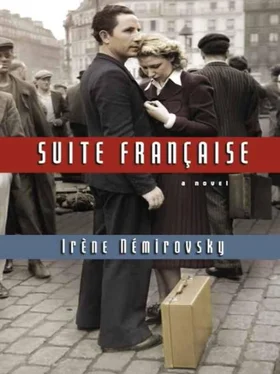"As a nation, we Germans too have a weakness that is also our greatest quality: our tactlessness, which is really a lack of imagination; we are incapable of putting ourselves in anyone else's place; we hurt people for no reason; we make others hate us, but that allows us to behave inflexibly and without faltering."
Since the Germans mistrusted their tendency to be tactless, they were particularly careful of what they said when speaking to the locals; they were therefore accused of being hypocrites. Even when Lucile asked Bruno, "And what's this celebration in honour of?" he avoided answering honestly. In Germany they always had a party around 24 June, he said, as it was the shortest night of the year. However, since the 24th had been set aside for large-scale manoeuvres, they had brought the date forward.
Everything was ready. They were setting up tables in the castle grounds; they had asked the local people to lend them their best table linen for a few hours. With respect, infinite care and under the supervision of Bruno himself, the soldiers had made their selection from the piles of damask tablecloths that lay deep inside cupboards. The middle-class ladies, eyes raised to heaven-"as if they were expecting to see Sainte Geneviève herself descend from on high," Bruno thought mischievously, "to strike down the sacrilegious Germans, guilty of daring to touch this family treasure made of fine linen, hemstitched, embroidered with birds and flowers"-these ladies stood guard and counted their towels in front of the soldiers. "I had four dozen of them: forty-eight, Lieutenant, and now there are only forty-seven."
"Allow me, Madame, to count them again with you. You're just upset, Madame, I'm sure we haven't lost any. Here's the last one; it fell on the floor. Allow me to pick it up and return it to you, Madame."
"Oh, so it is, I'm sorry, Monsieur," the lady replied with her most sour smile, "it's just that when cupboards are turned out like this, things disappear if you're not careful."
Nevertheless, he'd found a way to cajole them. "Naturally, we have no right to ask you to lend us these things," he said, saluting solemnly. "You know we're not entitled to them…"
He even implied that the General shouldn't find out: "He's so strict. He'd tell us off for behaving impertinently, but we're so bored. We want to have a wonderful party. It's a favour we're asking of you, Madame. You are perfectly free to refuse." Magic words! Even the most sullen face lit up with a hint of a smile (like the pale and dismal light of the winter sun, thought Bruno, shining on one of your opulent, decrepit houses).
"But why shouldn't you enjoy yourselves, Monsieur? You will take good care of these tablecloths, won't you? They were part of my dowry."
"Ah, Madame! I give you my word of honour that they will be returned to you intact, washed and ironed…"
"No, no! Just give them back as they are, thank you. Wash my linen! But we don't send them to the laundry, Monsieur. The maid launders them under my supervision. We use fine ashes…"
Then all he had to do was smile sweetly and say, "Well, what do you know! So does my mother."
"Oh, really? Your mother too? What a coincidence. Perhaps you could use some napkins as well?"
"Madame, I didn't like to ask."
"I can let you have two, three, four dozen. Would you like any cutlery?"
The soldiers had come out of the houses weighed down with clean, scented linen, their pockets full of dessert knives and holding, as if it were the Holy Sacrament, an antique punchbowl or some Empire coffee pot whose handle was decorated with ornamental leaves. Everything was stored in the château kitchens until the celebration.
The young women laughed and called out to the soldiers, "How are you going to dance with no women?"
"We'll have no choice, ladies. That's war for you."
The musicians would play from the conservatory. At the entrance to the grounds were pillars and poles decorated with garlands of flowers that would be used to hoist the flags: the regimental flag, which had been carried during the campaigns in Poland, Belgium and France and had emerged victorious from three capital cities, and the swastika-stained, Lucile whispered, with the blood of Europe. Yes, sadly, all of Europe, Germany included: the noblest, youngest, most fervent blood, which is always the first to be shed in battle. And with whatever blood remained, the world would have to be rebuilt. That is why the aftermath of war is so difficult…
Every day, from Chalon-sur-Saône, Moulins, Nevers, Paris and Epernay, military trucks arrived with cases and cases of champagne. If there couldn't be women, there would at least be wine, music and fireworks down by the lake.
"We're going to come and watch," the young Frenchwomen said. "Forget the curfew for one night, all right? Since you'll be having fun, you could at least let us have a good time, too. We'll take the road down to the château and watch you dance."
Laughing, the girls tried on party hats made of silvery lace, masks and paper flowers for their hair. What party had they been meant for? Everything was slightly crumpled, faded, as if it were second-hand or from some costume wardrobe in Cannes or Deauville belonging to a nightclub manager who, before September 1939, was counting on future seasons.
"How funny you'll look in all this," the women said.
The soldiers strutted about making funny faces.
Champagne, music, dancing, a rush of pleasure… so they could briefly forget the war and how quickly time was passing. The only thing they worried about was the possibility of a storm that night. But the nights were so clear… Then, suddenly, there was this terrible disaster! A comrade murdered, unheroically, killed by some drunken cowardly farmer. They had considered cancelling the celebration. But no! The warrior mentality reigned supreme here: the tacit acceptance that, immediately after you had died, your comrades would dispose of your shirts, your boots, and spend the whole night playing cards while you lay in the corner of some tent-if your remains had been found, that is. Yet it was also a mentality that accepted death as something natural, an ordinary soldier's destiny, and therefore refused to sacrifice a moment's pleasure because of it. Besides, the officers' main responsibility was to think of their men, to distract them from demoralising thoughts about future dangers and how very short life was. No, Bonnet had died without suffering much. He'd been given a beautiful funeral. He would not have wanted his comrades to be disappointed because of him. The celebration would take place as arranged.
Bruno gave in to the childish excitement around him. It was mad and slightly desperate-the kind of excitement that a truce brings out in soldiers, who see the possibility of a moment's relief from the day-to-day boredom. He didn't want to think about Bonnet, or about what was whispered behind the closed shutters of these grey, cold enemy houses. Like a child who's been promised to go to the circus and is then told he must stay home because some old, annoying relative is sick, Bruno wanted to say, "But what has that got to do with it? That's your problem. What has it got to do with me?" Did it have anything to do with him, Bruno von Falk? He wasn't just a soldier of the Reich; he wasn't motivated uniquely by what was best for his regiment or his country. He was a sensitive human being. He, like everyone else, was looking for happiness, the unhampered development of his abilities. Yet (like everyone else, sadly, during these times) his justifiable desires were constantly being thwarted by certain national interests called war, public security, the necessity of maintaining the prestige of the victorious army. A bit like the children of princes whose sole reason for existence is to carry out the wishes of their father, the king. He felt this majesty, the way the greatness and power of Germany reflected on him, as he walked through the streets of Bussy, as he rode through a village on horseback, as his spurs rattled at the doorstep of a French home. But what the French would never understand was that he was neither proud nor arrogant, but sincerely humble: terrified by the magnitude of his task.
Читать дальше

![Константин Бальмонт - Константин Бальмонт и поэзия французского языка/Konstantin Balmont et la poésie de langue française [билингва ru-fr]](/books/60875/konstantin-balmont-konstantin-balmont-i-poeziya-francuzskogo-yazyka-konstantin-balmont-et-thumb.webp)










